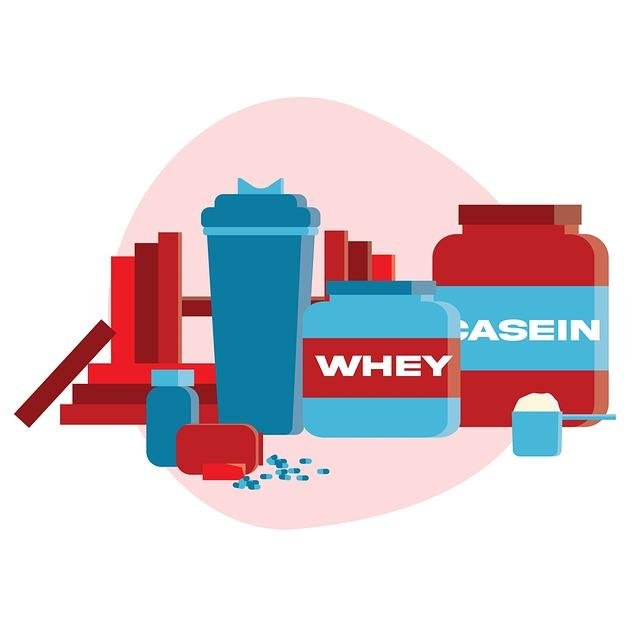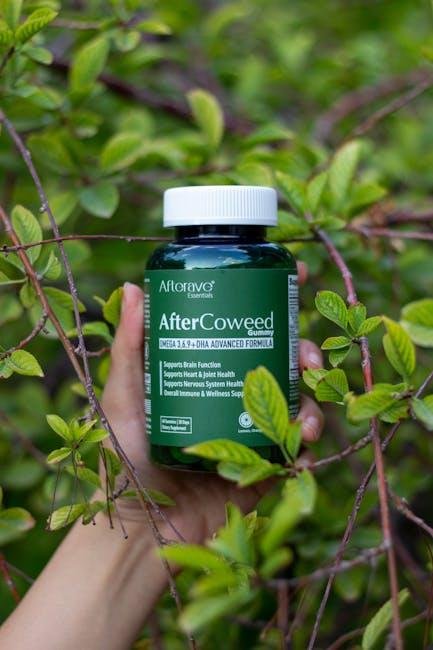In the intricate ecosystem of the human body, the gut stands as a bustling metropolis—home to trillions of microorganisms, a hub for digestion, and a key player in overall wellness. As modern science uncovers more about this hidden world, the conversation around gut health has surged into the spotlight. Navigating this landscape, many turn to supplements as allies in nurturing their digestive system. But what role do these supplements truly play? This article delves into the realm of supplements for gut health, exploring their benefits, limitations, and the science that guides their use. Whether you’re a curious newcomer or a seasoned health enthusiast, understanding these tools can help you make informed choices on your journey to a healthier gut.
Table of Contents
- Supplements That Support a Balanced Microbiome
- The Role of Probiotics and Prebiotics in Digestive Wellness
- Digestive Enzymes and Their Impact on Nutrient Absorption
- Fiber Supplements for Enhancing Gut Motility
- Herbal Extracts Known to Soothe the Digestive Tract
- Choosing Quality Supplements: What to Look for in Gut Health Products
- Q&A
- Future Outlook

Supplements That Support a Balanced Microbiome
Fostering a harmonious gut environment often begins with targeted nutritional support. Key supplements contribute vital compounds that nurture beneficial bacteria and create resilience against harmful strains. Among these, probiotics stand out, introducing live microorganisms which can help repopulate and maintain microbial diversity. Complementing them, prebiotics serve as the essential fuel for these friendly microbes, typically derived from fibers such as inulin and fructooligosaccharides.
In addition to probiotics and prebiotics, several other supplements enhance the ecosystem:
- Digestive enzymes – aid in breaking down food, improving nutrient absorption which indirectly supports microbial health.
- Polyphenols – plant compounds found in green tea or berries that promote the growth of beneficial bacteria.
- Multivitamins – ensuring adequate micronutrients like zinc and vitamin D, crucial for immune and gut lining integrity.
| Supplement | Primary Benefit |
|---|---|
| Probiotics | Restore microbial balance |
| Prebiotics | Stimulate beneficial bacteria |
| Digestive Enzymes | Enhance nutrient breakdown |
| Polyphenols | Support microbiota diversity |

The Role of Probiotics and Prebiotics in Digestive Wellness
Maintaining a balanced gut environment is essential for overall health, and this is where probiotics and prebiotics step in as powerful allies. Probiotics are live beneficial bacteria that, when consumed in adequate amounts, enhance the diversity and function of the gut microbiota. These friendly microbes assist in digesting food, producing essential vitamins, and defending against harmful pathogens. Including probiotic-rich foods or supplements can lead to improved digestion, a stronger immune response, and even reduced inflammation.
On the other hand, prebiotics are non-digestible fibers that serve as nourishment for these good bacteria, helping them thrive and multiply. Their presence supports a nourishing environment that fosters a balanced microbial community. Common sources include foods like garlic, onions, and chicory root, or targeted supplements designed to optimize gut health. Below is a quick guide to understanding their unique roles:
| Type | Primary Function | Common Sources |
|---|---|---|
| Probiotics | Introduce beneficial bacteria to the gut | Yogurt, kefir, kimchi |
| Prebiotics | Feed and support growth of good bacteria | Garlic, onions, bananas |
- Balanced gut flora can improve nutrient absorption.
- Enhanced immunity by supporting the gut-immune axis.
- Reduced digestive discomfort such as bloating and gas.

Digestive Enzymes and Their Impact on Nutrient Absorption
Digestive enzymes play a pivotal role in breaking down food into smaller, absorbable components, directly influencing how effectively our bodies extract nutrients. These biochemical catalysts target macronutrients such as proteins, carbohydrates, and fats, converting them into amino acids, simple sugars, and fatty acids respectively. When enzyme production is insufficient, nutrient absorption can be compromised, which may lead to deficiencies despite a nutritious diet. Supplementing with specific enzymes can enhance this process by compensating for natural enzymatic shortfalls, ensuring the gut maximizes nutrient uptake and supports overall well-being.
Incorporating digestive enzymes into your regimen can especially benefit individuals with compromised digestion due to aging, medical conditions, or lifestyle factors. Enzymes like amylase, protease, and lipase assist in the efficient breakdown and assimilation of food particles, reducing symptoms like bloating, gas, and discomfort. Below is a simple overview of common enzymes and their target nutrients:
| Enzyme | Target Nutrient | Key Benefit |
|---|---|---|
| Amylase | Carbohydrates | Improves energy availability |
| Protease | Proteins | Supports muscle repair and growth |
| Lipase | Fats | Enhances fat metabolism and vitamin absorption |

Fiber Supplements for Enhancing Gut Motility
Boosting gut motility often hinges on increasing dietary fiber intake, and fiber supplements have become a practical solution for many. These supplements work by absorbing water and bulking up the stool, which not only makes bowel movements easier but also stimulates the natural contractions of the intestines. Among the various options, psyllium husk stands out for its gentle yet effective benefits, providing a gel-like consistency that soothes the digestive tract and promotes regularity. Additionally, inulin and partially hydrolyzed guar gum offer prebiotic effects, nurturing beneficial gut bacteria while enhancing motility.
When selecting a fiber supplement, it’s vital to consider both the type of fiber and its solubility to get the best results. Soluble fibers dissolve in water and tend to have a calming effect on digestion, whereas insoluble fibers add bulk and speed transit time. Here’s a quick comparison to guide your choice:
| Fiber Type | Key Benefits | Common Sources |
|---|---|---|
| Soluble Fiber | Forms gel; slows digestion; feeds gut bacteria | Psyllium, Inulin, Oats |
| Insoluble Fiber | Adds bulk; speeds stool transit; prevents constipation | Wheat bran, Cellulose, Guar gum |
To optimize gut motility, consider starting with a mix of both kinds, gradually increasing the intake to avoid discomfort. Always accompany fiber supplements with plenty of water to help fiber perform its best role in your digestive journey. This approach will help your system reset and maintain smooth, natural movements over time.

Herbal Extracts Known to Soothe the Digestive Tract
Many natural remedies have been cherished for centuries due to their calming effects on the digestive system. Herbal extracts such as chamomile, ginger, and peppermint are often favored for their ability to reduce inflammation, alleviate nausea, and promote smooth digestion. Chamomile, for instance, is reputed for its gentle antispasmodic properties, providing relief from cramping and bloating. Ginger, with its warming effects, stimulates digestion and helps ease discomfort often caused by indigestion or motion sickness.
Incorporating these natural extracts into your daily routine can support gut health in a gentle and effective way. Below is a quick reference table featuring some popular herbs and their digestive benefits:
| Herbal Extract | Primary Benefit | Common Use |
|---|---|---|
| Chamomile | Calms stomach irritation | Relieves cramps, soothes inflammation |
| Ginger | Stimulates digestion | Reduces nausea, eases indigestion |
| Peppermint | Relaxes intestinal muscles | Alleviates bloating and gas |
| Slippery Elm | Protects mucous membranes | Soothes esophageal irritation |

Choosing Quality Supplements: What to Look for in Gut Health Products
When selecting supplements to support your gut health, it’s essential to focus on the quality and transparency of the product. Look for supplements made by reputable brands that undergo third-party testing to verify potency and purity. Ingredients should be clearly listed without hidden fillers or artificial additives. Moreover, prioritize those containing scientifically backed ingredients such as probiotics with multiple strains, prebiotics, and digestive enzymes, ensuring they meet your specific digestive needs.
Another vital factor is the supplement’s delivery system and dosage. Effective formulations often incorporate technology to protect delicate probiotics from stomach acid, enabling them to reach the intestines alive. Additionally, consult the label for an adequate CFU (colony-forming unit) count—generally ranging from 5 to 50 billion per serving depending on the strain and target benefit. Here’s a quick reference table to keep in mind:
| Feature | What to Look For |
|---|---|
| Probiotic Strains | Multiple, clinically tested strains such as Lactobacillus & Bifidobacterium |
| CFU Count | At least 5 billion per serving, adjusted for specific needs |
| Prebiotics | Natural fibers like inulin or FOS to nourish good bacteria |
| Packaging | Opaque, airtight containers to preserve potency |
Q&A
Q&A:
Q1: Why is gut health important?
A1: Your gut is more than just a food processor—it’s a complex ecosystem that influences digestion, immunity, mood, and even brain function. Maintaining a balanced gut environment helps your body absorb nutrients efficiently and fend off harmful pathogens.
Q2: What types of supplements support gut health?
A2: Common gut-friendly supplements include probiotics, prebiotics, digestive enzymes, and glutamine. Probiotics introduce beneficial bacteria, prebiotics feed these bacteria, enzymes help break down food, and glutamine supports the intestinal lining.
Q3: How do probiotics work in maintaining gut balance?
A3: Probiotics add live beneficial bacteria that can crowd out harmful microbes, enhance digestion, and modulate your immune response. Think of them as reinforcements that keep your gut community thriving.
Q4: Are prebiotics simply another type of probiotic?
A4: Not exactly. Prebiotics are non-digestible fibers that act as food for the good bacteria already living in your gut. By nourishing these helpful microbes, prebiotics help sustain a healthy gut environment.
Q5: Can gut supplements replace a healthy diet?
A5: Supplements can support gut health but aren’t a substitute for a balanced diet rich in fiber, whole foods, and hydration. They’re best thought of as allies—not replacements—in your journey to digestive wellness.
Q6: Are there any risks associated with gut health supplements?
A6: Most gut supplements are safe for healthy individuals, but some people might experience mild side effects like bloating or gas. It’s wise to consult a healthcare provider before starting any new supplement, especially if you have an existing condition.
Q7: How long does it take to notice benefits from gut supplements?
A7: Effects vary by individual and supplement type, but many people notice improved digestion or reduced discomfort within a few weeks. Consistency is key for lasting results.
Q8: Can supplements help with specific gut issues like IBS or leaky gut?
A8: Certain probiotics and nutrients like L-glutamine have shown promise in managing symptoms of IBS and supporting the gut barrier. However, targeted treatment should always be guided by a healthcare professional.
Q9: How can I choose the right gut health supplement?
A9: Look for scientifically backed strains of probiotics, transparent ingredient lists, and reputable brands. Quality matters—your gut deserves the best care!
Q10: What lifestyle habits complement supplements for a happy gut?
A10: Balanced eating, regular exercise, stress management, and adequate sleep all nurture your gut. Supplements work best when paired with a holistic approach to wellness.
Future Outlook
In the intricate landscape of gut health, supplements can serve as helpful allies—supporting balance, soothing discomfort, and nurturing the delicate ecosystem within. Yet, they are but one piece of a complex puzzle that includes diet, lifestyle, and individual needs. As science continues to unravel the mysteries of the microbiome, a thoughtful approach to supplementation, grounded in knowledge and tailored to your unique body, remains key. After all, a healthy gut is not just about what you add, but also about understanding and listening to the story your body tells.















Leave feedback about this